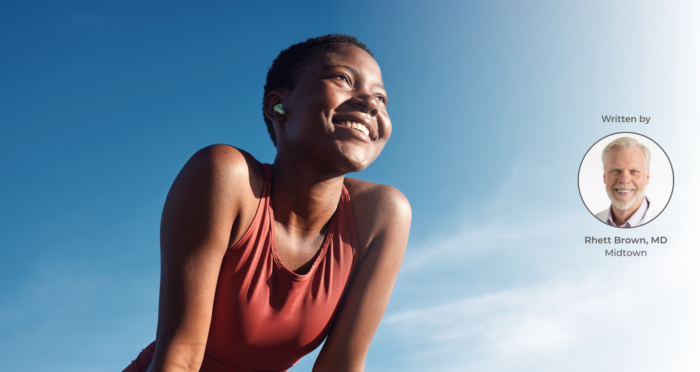As the temperatures rise during the peak of summer, so do the risks of heat-related illnesses. Whether you’re spending time at the beach, working in the yard, or attending outdoor events, understanding the signs of heat rash, dizziness, and dehydration can help you stay safe and enjoy the season to the fullest.
During the summer, many end up experiencing preventable heat-related symptoms. Let’s take a closer look at what to watch for, how to stay safe, and when it’s time to seek medical help!
Understanding the Summer Heat’s Impact on Your Body
Hot and humid conditions can strain your body’s ability to regulate temperature. Sweating is your body’s natural way to cool down, but excessive sweating or exposure to high temperatures for prolonged periods can lead to heat rash, dizziness, and dehydration—each with its own set of health concerns.
1. What Is Heat Rash?
Heat rash, also known as prickly heat or miliaria, happens when sweat gets trapped under your skin due to blocked pores. This common summer skin condition is especially prevalent in areas where sweat can pool, such as the neck, back, chest, under the breasts, or in skin folds.
Common Symptoms of Heat Rash:
- Small red bumps or blisters
- An itchy or prickly sensation
- Mild swelling
- Clusters of bumps in areas of high sweat concentration
How to Prevent and Treat Heat Rash:
- Stay cool and dry: Wear lightweight, breathable clothing (like cotton or moisture-wicking materials).
- Avoid heavy creams: These can block sweat glands and worsen the condition.
- Cool showers and dry skin thoroughly after sweating.
- Use over-the-counter remedies like calamine lotion or hydrocortisone cream for relief.
In most cases, heat rash will go away on its own with cooling measures. However, if the rash becomes painful, infected, or persists for more than a few days, check in with your provider.
2. Dizziness: A Warning Sign That Shouldn’t Be Ignored
Feeling dizzy, lightheaded, or weak in the summer heat could be your body’s way of telling you it’s overwhelmed. Dizziness is a symptom, not a diagnosis, and it may signal something serious like heat exhaustion, low blood pressure, or dehydration.
Signs of Heat-Related Dizziness or Heat Exhaustion:
- Lightheadedness or fainting
- Fatigue or weakness
- Excessive sweating
- Cold, clammy skin
- Nausea or headache
- Rapid pulse
What to Do If You Feel Dizzy:
- Move to a cooler environment immediately.
- Hydrate slowly with water or a sports drink containing electrolytes.
- Lie down and elevate your feet if possible.
- Loosen tight clothing and apply a cool cloth to your forehead or neck.
If dizziness is severe, recurrent, or accompanied by confusion, vomiting, or a fast heartbeat, seek medical attention right away—it may be a sign of heat stroke, which is a medical emergency.
3. Dehydration: The Silent Summer Risk
Dehydration occurs when your body loses more fluids than it takes in, and it can happen surprisingly fast during summer activities—especially if you’re not replenishing fluids regularly.
Early Signs of Dehydration:
- Thirst
- Dry mouth
- Dark yellow urine
- Fatigue
- Headache
More Serious Signs:
- Dizziness or confusion
- Rapid heart rate
- Decreased urination
- Irritability
- Sunken eyes or dry skin
How to Prevent Dehydration:
- Drink water regularly, even if you don’t feel thirsty. Aim for at least 8–10 cups per day, more if you’re active or in the sun.
- Limit caffeine and alcohol, which can increase fluid loss.
- Eat water-rich foods like watermelon, cucumbers, oranges, and lettuce.
- Replenish electrolytes if sweating heavily or working outside for extended periods. Consider coconut water or electrolyte-replacement drinks.
- Avoid peak sun hours (10 AM – 4 PM) if possible.
Who’s Most at Risk in the Heat?
Certain populations are more vulnerable to the effects of heat and dehydration. These include:
- Older adults, who may not sense thirst as easily and may have other chronic conditions
- Young children, who dehydrate more quickly
- People taking certain medications, like diuretics, antihistamines, or blood pressure meds
- Individuals with chronic illnesses, such as diabetes or heart disease
- Outdoor workers or athletes, who lose fluids and electrolytes through heavy sweating
If you or a loved one falls into one of these categories, it’s especially important to monitor for early signs of dehydration and heat-related stress.
When to See a Doctor
Mild symptoms of heat rash or dehydration can often be managed at home. However, seek medical attention immediately if you or someone else experiences:
- Confusion or disorientation
- Fainting or persistent dizziness
- Rapid or weak pulse
- No sweating despite heat exposure (a sign of heat stroke)
- High fever
- Skin rash that is painful, spreading, or looks infected
- Inability to keep fluids down
Primary care providers are well-equipped to assess heat-related symptoms, offer guidance, and provide treatment plans tailored to your lifestyle and health history.
Summer Wellness Starts With You
Summer is a time to enjoy the outdoors, make memories, and stay active—but it’s also a season when heat-related conditions can sneak up on us. By staying informed, drinking plenty of water, wearing appropriate clothing, and listening to your body, you can avoid many of the most common summertime health concerns.
If you ever feel unsure about a symptom, your primary care team is here to help. We’re just a call or a visit away and ready to support your health in every season.



